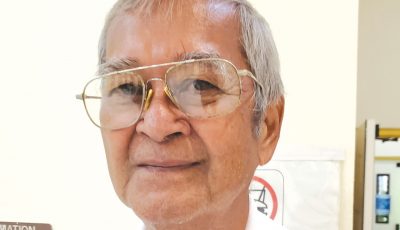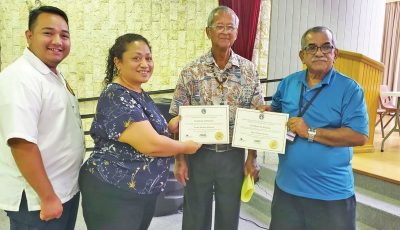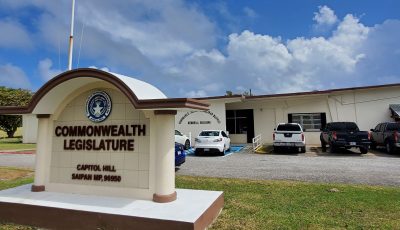DESPITE GOVERNOR’S WISHES
SC: AG may decline to appeal judgment
The CNMI Supreme Court ruled yesterday that the attorney general may decline to appeal an adverse judgment despite the wishes of the governor or a client government agency.
The justices also ruled that the governor or client agency may not hire, without a grant or authority from the AG, outside counsel to prosecute the appeal.
Associate Justice John A. Manglona penned the high court’s decision. Chief Justice Alexandro C. Castro and Associate Justice Perry B. Inos concurred.
Castro, however, wrote separately to underscore the fine line between the “legal affairs” and the “public policy decisions” of the Commonwealth.
Castro said the AG has absolute discretion in filing, prosecuting, and appealing a criminal case.
In civil cases, however, where the issue touches upon or threatens the “integrity of the Covenant” or the “NMI Constitution,” the AG—while he has the authority to exercise his discretion—should defer to the governor whether to appeal an adverse judgment because that involves public policy decision-making authority which the governor has been elected by the people to so decide, Castro said.
Gov. Ralph DLG Torres and AG Edward Manibusan filed before the CNMI Supreme Court two certified questions pertaining to an appeal on voting right ruling.
Torres and Manibusan raised the question whether the AG may decline to appeal an adverse judgment despite the wishes of the governor or a client government agency.
The two officials also asked whether the governor or client agency may hire, without the AG’s prior approval, an outside lawyer to prosecute the appeal.
Torres wrote a letter in July 2017 to the U.S. Supreme Court’s clerk of court to rebut Manibusan’s letter that says the petition that Torres and the Commonwealth Election Commission filed about the voting right issue before the high court was unauthorized.
In the letter, Torres asked the U.S. Supreme Court’s clerk of court to disregard Manibusan’s “attempt to cast doubt” on the petition for certiorari, since he and the other petitioners endorse, approve and authorize it in full.
The petition seeks a re-examination of the U.S. Court of Appeals for the Ninth Circuit’s decision affirming U.S. District Court for the NMI Chief Judge Ramona V. Manglona’s ruling that voters who are not of Northern Marianas descent must be able to vote on Article 12 initiative and any other initiatives to amend Article 12.
The U.S. Supreme Court’s office of the clerk informed the 9th Circuit that the petition filed by Torres, CEC, and CEC officials has been denied.
Joseph Horey, who represents the Northern Marianas Descent Corp., filed the petition on behalf of Torres, CEC, and CEC officials.
Manibusan informed the U.S. Supreme Court’s clerk of court in a letter dated June 20, 2017, that such filing was unauthorized.
In the CNMI Supreme ruling, Manglona and Inos said the text of the NMI Constitution—not common law powers—bestows the AG the power and responsibility to prosecute cases and appeals and to represent the Commonwealth.
Manglona and Inos said they find unreasonable to assume the NMI Constitution was based upon the cases cited by petitioners Torres and Manibusan because the CNMI’s legislative history is silent as to which jurisdiction the framers sought guidance from in drafting the NMI Constitution.



























